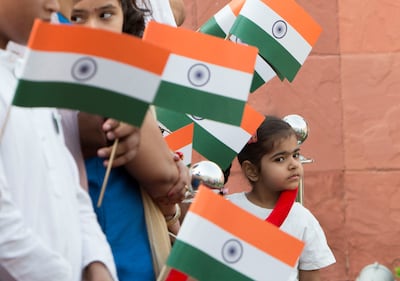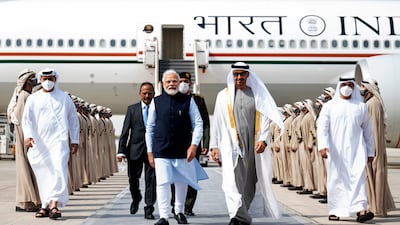If a picture is worth a thousand words, the picture of the warm embrace between UAE President Sheikh Mohamed bin Zayed and Indian Prime Minister Narendra Modi was worth a million. Sheikh Mohamed receiving Mr Modi at the Presidential Airport in Abu Dhabi on June 28 went well beyond diplomatic protocol. And so has the relationship between India and the UAE. The personal chemistry between the leaders, and their vision, continue to guide bilateral relations.
As if ordained by destiny, while India celebrates the 75th year of independence, the UAE also celebrates the Year of the 50th, the golden jubilee of the formation of the UAE. Furthermore, this is also the year when our two countries complete 50 years of diplomatic relations. To mark this historic milestone, the leaders released a postage stamp during their virtual summit in February this year.
The UAE hosts about 3.5 million Indians – about 25 per cent of India’s diaspora, the largest anywhere in the world. A key pillar of the strong relationship, the Indian community is acknowledged to be a significant contributor to the UAE’s economy. The UAE has provided Indians a home away from home where they can work and contribute to the economies of both countries and also benefit from the welcoming and harmonious socio-economic ecosystem.
In February this year, the bilateral trade relations took a quantum leap with the signing of the India-UAE Comprehensive Economic Partnership Agreement (CEPA). This agreement has given market access to 97 per cent of tariff lines accounting for 99 per cent of Indian exports since May 1. The CEPA was the first of its kind signed by India in the Middle East and North Africa region, and the first by the UAE with any country of the world. It is remarkable that negotiations for this historic agreement took a mere 88 days, and that they were made possible only through mutual trust and commitment. The agreement has taken our bilateral relations to the next level. While trade deals take years to negotiate, the CEPA has proven that mutual trust and commitment to work together is all that is required to close trade deals.
India and UAE took another significant step in strengthening their comprehensive strategic partnership with the Joint Vision Document unveiled during the leaders’ virtual summit in February. Aptly titled “New Frontiers, New Milestones”, this document charts the pathway towards a shared future. While it seeks to build on past achievements, it lays down new avenues of co-operation such as fintech, clean energy and climate action, food security, sustainability, digital payments, cyber security, cryptocurrencies, and advanced technologies, among others. Another historic announcement marked what might become the beginning of a new epoch in India-UAE higher education co-operation: the establishment of an Indian Institute of Technology in Abu Dhabi.

On the multilateral front, India and the UAE have been working closely in the UN Security Council during current turbulent geopolitical times. India and UAE jointly broke new ground with the announcement of the I2U2 Group along with Israel and the US in October 2021. In a matter of months, the I2U2 summit was convened between Sheikh Mohamed, Mr Modi, US President Joe Biden and Israeli Prime Minister Yair Lapid in July, this year. With an outcome-oriented approach, the I2U2 Joint statement was full of intent, content and key announcements, including an investment of $2 billion by the UAE to develop food parks in India and a $330 million joint project to develop renewable energy capacity of up to 300 megawatt in India. The goal of I2U2 transcends national boundaries and is aimed at harnessing the vibrancy and entrepreneurial spirit of the four societies and economies to tackle some of the greatest challenges confronting the world today. I2U2 takes forward the Abraham Accords of August 2020 by opening new avenues for plurilateral co-operation in a concrete manner.
Organising Expo 2020 Dubai at a time when the world was in the grips of despair and fear has shown to the world the true mettle of the UAE. With a footfall of more than 24 million in a short duration of six months, during the pandemic, was no mean achievement. Expo 2020 Dubai was home to the dazzling India Pavilion, with one of the highest footfalls. Further, it is an honour for India to be among the countries allotted a permanent pavilion. Clearly, India and the UAE are an important element in each other’s future.
The UAE is today perhaps India’s closest partner in the Mena region. Their relationship is as much about its glorious past as it is about its bright future.
Sunjay Sudhir is the Indian ambassador to the UAE


